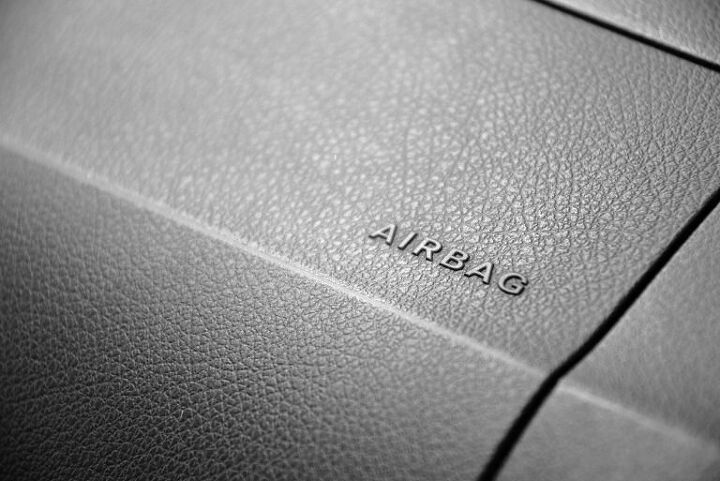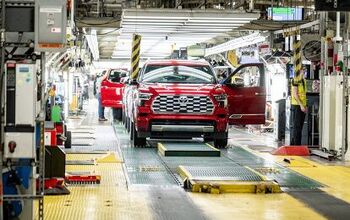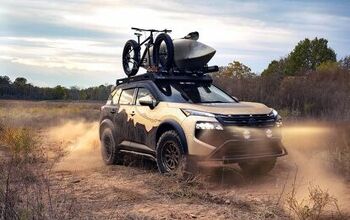The Millions of Airbags Takata Replaced Could Still Be Extremely Dangerous

Takata, the parts supplier that furnished automakers with millions of extremely dangerous airbag inflators, was forced to issue another recall last week. Considering the hundreds of millions of units already recalled by the company, another 2.7 million is a drop in the bucket. But there’s a slight problem, as these newly recalled inflators are devices that have already been replaced.
In 2015, regulators specified Takata had until the end of 2019 to ensure its replacement airbag inflators were safe. With the “fixed” units now under scrutiny, automakers may be liable for the supplier’s wrongdoing as the millions upon millions of recalled inflators would need to be replaced for a second time. The current recall was prompted after the U.S. National Highway Traffic Safety Administration found the drying agent added specifically to combat the moisture that degrades the ammonium nitrate compound wasn’t effective.
“Absent proof that the other desiccated inflators are safe, they will also be subject to recall,” the NHTSA said in a statement last week.
Takata stated it has produced roughly 100 million replacement inflators containing drying agents. The 2.7 million recalled last week used calcium sulfate while the rest used zeolite.
According to Reuters, automakers have been burdened with a significant portion of the estimated $10 billion cost of replacing the faulty inflators. They’d also be liable in the event of NHTSA deciding Takata failed to adequately address the safety issues with the remaining recalled units. At this point, there isn’t much more that can be done with the Japanese supplier. Takata filed for bankruptcy in June and has since been purchased by Michigan-based Key Safety Systems for $1.6 billion.
“The automakers … and Takata — they all know that this is a future issue,” said Scott Upham, chief executive at Valient Market Research, whose clients consist of several auto parts suppliers. “But I think everybody is concerned about the near-term issues, and the financial arrangements of the bankruptcy.”
Obviously, the most pressing short-term danger consists of additional harm to motorists. So far, the faulty inflators have contributed to at least 17 known fatalities and countless injuries.
Takata is the only airbag manufacturer to use ammonium nitrate as a propellant in its systems. It’s unlikely that will ever change, due to the compound’s volatile tendencies. Takata’s inflators can rupture the airbag, spraying vehicle occupants with shrapnel, after the compound is exposed to moisture or high temperatures for prolonged periods. While the drying agents used appear to have stabilized the propellant somewhat, fears remain that it’s simply too volatile to be used in inflators and will require removal if the NHTSA isn’t satisfied.
Honda is likely to be the company most hurt by a second round of recalls, since it used more of Takata’s inflators than any competitor. But it won’t be the only one to suffer. Toyota, Nissan, General Motors, Ford, Fiat Chrysler, Mazda, Subaru, Jaguar Land Rover, Mitsubishi, Tesla, Fisker, Ferrari, McLaren, BMW, Mercedes-Benz, and Volkswagen Group have also all been affected by the recall.

A staunch consumer advocate tracking industry trends and regulation. Before joining TTAC, Matt spent a decade working for marketing and research firms based in NYC. Clients included several of the world’s largest automakers, global tire brands, and aftermarket part suppliers. Dissatisfied with the corporate world and resentful of having to wear suits everyday, he pivoted to writing about cars. Since then, that man has become an ardent supporter of the right-to-repair movement, been interviewed on the auto industry by national radio broadcasts, driven more rental cars than anyone ever should, participated in amateur rallying events, and received the requisite minimum training as sanctioned by the SCCA. Handy with a wrench, Matt grew up surrounded by Detroit auto workers and managed to get a pizza delivery job before he was legally eligible. He later found himself driving box trucks through Manhattan, guaranteeing future sympathy for actual truckers. He continues to conduct research pertaining to the automotive sector as an independent contractor and has since moved back to his native Michigan, closer to where the cars are born. A contrarian, Matt claims to prefer understeer — stating that front and all-wheel drive vehicles cater best to his driving style.
More by Matt Posky
Latest Car Reviews
Read moreLatest Product Reviews
Read moreRecent Comments
- Varezhka Maybe the volume was not big enough to really matter anyways, but losing a “passenger car” for a mostly “light truck” line-up should help Subaru with their CAFE numbers too.
- Varezhka For this category my car of choice would be the CX-50. But between the two cars listed I’d select the RAV4 over CR-V. I’ve always preferred NA over small turbos and for hybrids THS’ longer history shows in its refinement.
- AZFelix I would suggest a variation on the 'fcuk, marry, kill' game using 'track, buy, lease' with three similar automotive selections.
- Formula m For the gas versions I like the Honda CRV. Haven’t driven the hybrids yet.
- SCE to AUX All that lift makes for an easy rollover of your $70k truck.


































Comments
Join the conversation
Do a Google search on "Bloomberg Takata Moses Lake" It mentions the company. Go back into their history.
Do a Google search on “Bloomberg Takata Moses Lake” It mentions the company. Go back into their history.